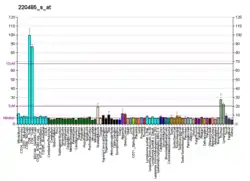SIRPG
Signal-regulatory protein gamma is a protein that in humans is encoded by the SIRPG gene.[3][4][5] SIRPG has also recently been designated CD172G (cluster of differentiation 172G).
The protein encoded by this gene is a member of the signal-regulatory protein (SIRP) family, and also belongs to the immunoglobulin superfamily. SIRP family members are receptor-type transmembrane glycoproteins known to be involved in the negative regulation of receptor tyrosine kinase-coupled signaling processes. Alternatively spliced transcript variants encoding different isoforms have been described.[5]
References
- GRCh38: Ensembl release 89: ENSG00000089012 - Ensembl, May 2017
- "Human PubMed Reference:". National Center for Biotechnology Information, U.S. National Library of Medicine.
- Ichigotani Y, Matsuda S, Machida K, Oshima K, Iwamoto T, Yamaki K, Hayakawa T, Hamaguchi M (Jan 2001). "Molecular cloning of a novel human gene (SIRP-B2) which encodes a new member of the SIRP/SHPS-1 protein family". J Hum Genet. 45 (6): 378–82. doi:10.1007/s100380070013. PMID 11185750.
- van den Berg TK, van Beek EM, Buhring HJ, Colonna M, Hamaguchi M, Howard CJ, Kasuga M, Liu Y, Matozaki T, Neel BG, Parkos CA, Sano S, Vignery A, Vivier E, Wright M, Zawatzky R, Barclay AN (Dec 2005). "A nomenclature for signal regulatory protein family members". J Immunol. 175 (12): 7788–9. doi:10.4049/jimmunol.175.12.7788. PMID 16339511.
- "Entrez Gene: SIRPG signal-regulatory protein gamma".
Further reading
- Kharitonenkov A, Chen Z, Sures I, et al. (1997). "A family of proteins that inhibit signalling through tyrosine kinase receptors". Nature. 386 (6621): 181–6. Bibcode:1997Natur.386..181K. doi:10.1038/386181a0. PMID 9062191. S2CID 4259314.
- Deloukas P, Matthews LH, Ashurst J, et al. (2002). "The DNA sequence and comparative analysis of human chromosome 20". Nature. 414 (6866): 865–71. doi:10.1038/414865a. PMID 11780052.
- Strausberg RL, Feingold EA, Grouse LH, et al. (2003). "Generation and initial analysis of more than 15,000 full-length human and mouse cDNA sequences". Proc. Natl. Acad. Sci. U.S.A. 99 (26): 16899–903. doi:10.1073/pnas.242603899. PMC 139241. PMID 12477932.
- Brooke G, Holbrook JD, Brown MH, Barclay AN (2004). "Human lymphocytes interact directly with CD47 through a novel member of the signal regulatory protein (SIRP) family". J. Immunol. 173 (4): 2562–70. doi:10.4049/jimmunol.173.4.2562. PMID 15294972.
- Piccio L, Vermi W, Boles KS, et al. (2006). "Adhesion of human T cells to antigen-presenting cells through SIRPbeta2-CD47 interaction costimulates T-cell proliferation". Blood. 105 (6): 2421–7. doi:10.1182/blood-2004-07-2823. PMID 15383453.
- Gerhard DS, Wagner L, Feingold EA, et al. (2004). "The status, quality, and expansion of the NIH full-length cDNA project: the Mammalian Gene Collection (MGC)". Genome Res. 14 (10B): 2121–7. doi:10.1101/gr.2596504. PMC 528928. PMID 15489334.
- Kimura K, Wakamatsu A, Suzuki Y, et al. (2006). "Diversification of transcriptional modulation: large-scale identification and characterization of putative alternative promoters of human genes". Genome Res. 16 (1): 55–65. doi:10.1101/gr.4039406. PMC 1356129. PMID 16344560.
External links
- PDBe-KB provides an overview of all the structure information available in the PDB for Human Signal-regulatory protein gamma (SIRPG)
This article incorporates text from the United States National Library of Medicine, which is in the public domain.
This article is issued from Wikipedia. The text is licensed under Creative Commons - Attribution - Sharealike. Additional terms may apply for the media files.


